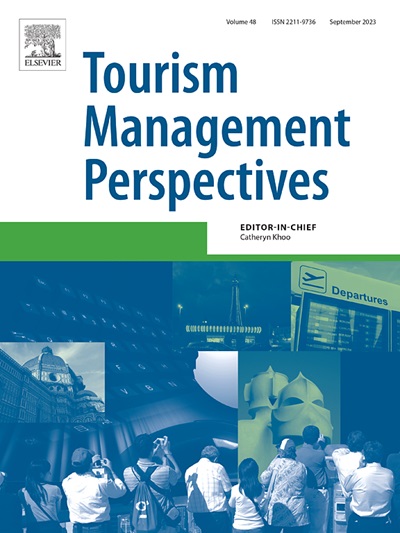Understanding travel constraints, negotiation strategy and travel expenditure: An empirical study of Chinese senior tourism
IF 6.9
2区 管理学
Q1 HOSPITALITY, LEISURE, SPORT & TOURISM
引用次数: 0
Abstract
Population aging promotes the senior tourism market in China. In practice, however, the travel expenditure of Chinese seniors is relatively low, despite their high desire to travel. This study examines the effects of travel constraints and negotiation strategies on the travel expenditure of Chinese senior tourists. Based on the travel constraint negotiation theory, we first identify the subdimensions of intrapersonal constraints (physical issues and mental problems), interpersonal constraints (lack of partners and caring for grandchildren), and structural constraints (financial restriction and employment status). In addition, we distinguish two types of negotiation strategies from the perspective of adult children's support, including emotional support and financial support. By examining a rich dataset of 12,905 Chinese seniors spanning 2011 to 2020 from the China Health and Retirement Longitudinal Study (CHARLS project) through zero inflated negative binomial regression, we find that physical issues, mental problems, lack of partners, financial restriction and employment status have significant negative effects on travel expenditure, while caring for grandchildren has a significant positive effect on travel expenditure. Meanwhile, both emotional support and financial support from adult children play important roles in moderating the relationships between travel constraints and travel expenditure. This study not only provides a deeper understanding of the travel constraints affecting seniors' travel expenditure and the ways in which they can negotiate these travel constraints in the Chinese cultural context but also offers valuable guidelines for the tourism industry.
旅游约束、谈判策略与旅游支出:中国老年人旅游的实证研究
人口老龄化促进了中国老年旅游市场的发展。然而,在实践中,中国老年人的旅游支出相对较低,尽管他们有很高的旅游愿望。本研究考察了旅游约束和谈判策略对中国老年游客旅游支出的影响。基于旅行约束谈判理论,我们首先确定了个人约束(身体问题和心理问题)、人际约束(缺乏伴侣和照顾孙子孙女)和结构约束(经济限制和就业状况)的子维度。此外,我们从成年子女的支持角度区分了两种类型的谈判策略,包括情感支持和经济支持。通过对中国健康与退休纵向研究(CHARLS)项目2011 - 2020年12905名中国老年人的丰富数据集进行零膨胀负二项回归分析,我们发现身体问题、精神问题、缺乏伴侣、经济限制和就业状况对出行支出有显著的负向影响,而照顾孙辈对出行支出有显著的正向影响。同时,成年子女的情感支持和经济支持在旅游约束与旅游支出的关系中起重要调节作用。本研究不仅让我们更深入地了解影响老年人旅游消费的旅游制约因素,以及他们在中国文化背景下如何应对这些旅游制约因素,而且为旅游业提供了有价值的指导。
本文章由计算机程序翻译,如有差异,请以英文原文为准。
求助全文
约1分钟内获得全文
求助全文
来源期刊

Tourism Management Perspectives
Multiple-
CiteScore
15.60
自引率
3.40%
发文量
99
审稿时长
59 days
期刊介绍:
Tourism Management Perspectives is an interdisciplinary journal that focuses on the planning and management of travel and tourism. It covers topics such as tourist experiences, their consequences for communities, economies, and environments, the creation of image, the shaping of tourist experiences and perceptions, and the management of tourist organizations and destinations. The journal's editorial board consists of experienced international professionals and it shares the board with Tourism Management. The journal covers socio-cultural, technological, planning, and policy aspects of international, national, and regional tourism, as well as specific management studies. It encourages papers that introduce new research methods and critique existing ones in the context of tourism research. The journal publishes empirical research articles and high-quality review articles on important topics and emerging themes that enhance the theoretical and conceptual understanding of key areas within travel and tourism management.
 求助内容:
求助内容: 应助结果提醒方式:
应助结果提醒方式:


